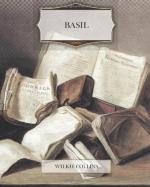“He forged a bond, to prop up his credit for a little time longer. The name he made use of was the name of his patron. In doing this, he believed—as all men who commit crime believe—that he had the best possible chance of escaping consequences. In the first place, he might get the long-expected situation in time to repay the amount of the bond before detection. In the second place, he had almost the certainty of a legacy from a rich relative, old and in ill-health, whose death might be fairly expected from day to day. If both these prospects failed (and they did fail), there was still a third chance—the chance that his rich patron would rather pay the money than appear against him. In those days they hung for forgery. My father believed it to be impossible that a man at whose table he had sat, whose relatives and friends he had amused and instructed by his talents, would be the man to give evidence which should condemn him to be hanged on the public scaffold.
“He was wrong. The wealthy patron held strict principles of honour which made no allowance for temptations and weaknesses; and was moreover influenced by high-flown notions of his responsibilities as a legislator (he was a member of Parliament) to the laws of his country. He appeared accordingly, and gave evidence against the prisoner; who was found guilty, and left for execution.
“Then, when it was too late, this man of pitiless honour thought himself at last justified in leaning to the side of mercy, and employed his utmost interest, in every direction, to obtain a mitigation of the sentence to transportation for life. The application failed; even a reprieve of a few days was denied. At the appointed time, my father died on the scaffold by the hangman’s hand.
“Have you suspected, while reading this part of my letter, who the high-born gentleman was whose evidence hung him? If you have not, I will tell you. That gentleman was your father. You will now wonder no longer how I could have inherited the right to be his enemy, and the enemy of all who are of his blood.
“The shock of her husband’s horrible death deprived my mother of reason. She lived a few months after his execution; but never recovered her faculties. I was their only child; and was left penniless to begin life as the son of a father who had been hanged, and of a mother who had died in a public madhouse.
“More of myself to-morrow—my letter will be a long one: I must pause often over it, as I pause to-day.”




